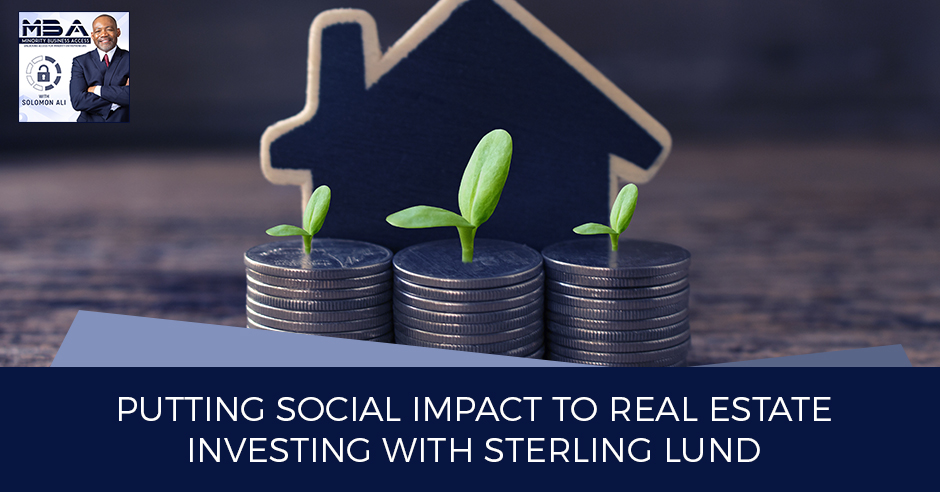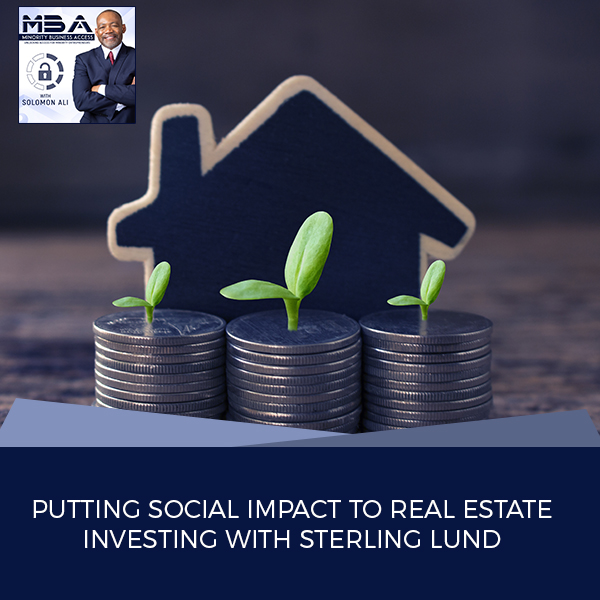
Real estate investing is more than just the act of buying and selling at home. Not your typical syndication business, Sterling Lund, the founder of Refuge Investments, LLC, is putting social impact to real estate, where he and his team are targeting distressed assets that benefit from their management and renovation experience to improve the lives of the families that call their properties home. In this episode, he joins Solomon Ali to take us deep into their great work while sharing how they are doing in this time of the pandemic. Sterling also talks about some of his experiences working with investors and developers on renovating properties and what he thinks about the current marketplace, where he believes it is going, and whether or not it will help change society and how we do business.
—
Watch the episode here
Listen to the podcast here
Putting Social Impact To Real Estate Investing With Sterling Lund
Sterling, it is great to have you here on the show. We’re at another Magnify Your Wealth and I’m excited to see you and your wife, and to hear about all the great and wonderful things that you guys are doing.
Thank you. It’s a pleasure to be here. It’s good to see you again.
The pleasure is all mine. Tell us a little bit about what you’ve been doing in 2020.
We’ve been developing greater inroads into the broker markets and broker communities to acquire apartment complexes. We’re still chasing those projects and benefiting from the workforce housing model that we’re a niche business in.
How’s that working out?
It’s been a very good year. We’ve brought on a couple of new projects. We’ve gained a lot of momentum and we love the progress we’ve made in our business model.
Is the progress due to COVID or did you change your business model up?
There have been some changes forced by the COVID. COVID has done a number on the capital markets. It has done a number on the lending side of the business. They even shut down for a while, which was disruptive and destabilizing. There were a lot of bridge lenders and short-term loans that providers just went away. It changed the playing field tremendously. We did have some quick steps to save a deal. We were quoted for a bridge loan, which is a short-term loan, for us to reposition a property. They came back at 9% interest. I hadn’t heard of 9% interest in years.
Nine percent was back pre-2000.
During COVID, we learned that the convenience of being at home beats sitting in traffic for an hour.
When we had the opportunity to connect with a non-profit lender that came alongside us, we were able to reduce that number dramatically and brought that interest rate back in line about 4.5% for a short-term loan, which was phenomenal.
You’re in the apartment business. That’s what you do. You acquire apartment complexes. That seems to be a pretty unique skillset. I don’t think everyone can do it. How did you get into it?
Since college, I started to be an architect and learned a little bit about the industry after spending some time in the education, and concluded that I probably wasn’t that much of an office guy. I liked being more involved in the process. I took some of my previous construction experience and began to be a superintendent building apartment complexes. That’s where I started. I began building and developing apartments up until the transition to Refuge Investments.
If someone wanted to get into the business that you’re doing, what would they do? What would you recommend them to do?
The first thing would be to educate any gaps in expectation or understanding of the business space. Fortunately, there are a number of internet gurus that have good onboarding programs that would allow them to learn about the acquisitions or the purchase process, learn about the management process, even the lending and contract side of the business, which is pretty unique. It helps abbreviate that learning curve so that they could come in and get on board in that space with confidence. That would be a great place to start if they hadn’t had any background in this industry.
We’re at COVID. There are rumors and talks that there may be another shutdown. Tightening on credit lines and loans may take place again. Is that going to affect business?
I can speak to the two previous seasons of COVID. Earlier in 2020 when everybody was a little frantic and we didn’t know what it was, we didn’t know how to handle it. We can speak to that and identify that when we had a plan and we understood how to approach it. I can share a little example of what we did. We gathered all kinds of data on unemployment and nonprofits, and services to residents and renters to help them through any crisis, whether it was COVID or just unemployment in general. We consolidated all that data onto a knowledge sheet or a white paper that we were able to hand out to all our residents prior to the event taking shape or becoming scary. We were remarkably proactive. In that first wave, we never saw a dip in revenues on our properties.
It was quite remarkable because we’re in that workforce housing space where when the hospitality industry shut down, we know that affected some of the folks that live in our properties. When the airports scaled way back, we have individuals that work at the airport that stay in our communities. It did affect their job prospects and their employment prospects, but because they had already had these resources in place, they were insulated from the impact. That turned around and insulated us as property owners.
You were a huge blessing to them to be able to share that information and go out and do the research for them so that they didn’t have to find it on their own.
I’d like to believe so. One of the cries of our heart is to do good while we’re doing business. We can talk more about that, but that was instrumental again in the second wave of impact to the rental communities when the CDC concluded that we’re going to eliminate the opportunity for an eviction to occur because housing is so critical to families and the community itself at large. That tends to encourage folks to stop paying rent, even if they can afford to. That’s an unfortunate thing because we’re still obliged to pay our mortgage. We’re still obliged to pay our managers and our maintenance guys. That shortfall would be detrimental to our business model.
Here we are several months even into CDCs announcement and we have not experienced that shortfall or that impact to our cashflow because of the proactive nature of our interactions with our residents. I’d build on that to say that we’re probably also benefiting from several seasons of devotion to our residents before this event even occurred. We had built that relationship or rapport where when we make a phone call to our residents, they pick up and want to talk to us. They don’t hide when they get in distress because we have programs even in our own organization to help our residents get back on their feet if they stumble.
You had developed a relationship so it was an ongoing relationship.

Social Impact Real Estate: Before jumping to real estate, identify your appetite for investing and if apartments or the real estate space is of value to you.
You continue to build on a relationship we had already fostered.
What you’re doing is unheard of in your industry.
I’ve been surprised but I feel that we are doing something rather unique in that. I’m building a better understanding of how different our business is from the typical syndication or apartment investor business. We’ve taken it past the for-profit model, which we are. All of our investors are treated to market-rate returns, above-average returns. We treat the business as for-profit. We are not a nonprofit entity. The activities that we do to invest in our residents include classes on single parenting, how to get out of debt, how to fix your credit.
We have job fairs that come through the property and do interviews and hire on the spot. They were coming by once a quarter. Now they’re coming by about once every four months because COVID has slowed things down in general. We don’t push it if the limits of the city don’t gather. Once the city begins to loosen up again, we have another wave of this job fair process. We have employers that come to our properties and interview on-site. Our average is hiring four people at every event.
Let me back up a little bit. I asked you how you got into the business and you told me. Tell me about your first deal, the experience of it.
That was a 112-unit deal that a friend of mine had found. He didn’t have the construction or apartment experience that I could bring. I got a phone call one day and he says, “Sterling, I’ve got this deal. I’m excited about it. I’d love for you to take a look at it.” That began this adventure of, “I want to see that. Let’s go take a look.” It turned into a big pursuit and a lot of excitement about the diligence and all the pre-purchase work of qualifying that property but also that process of raising capital.
Were you a little nervous?
I was in adulation and excitement. Over here, I was wrought with anxiety and stress, and how are we going to raise enough money? We have a clock ticking. That escrow is so short when you have to raise money.
When I did real estate, I did it in nursing homes with a lot of commercial property. I would come up with that down payment of 20% and everything and sometimes 30%. At the time that I’m doing the due diligence, I know I’ve got to find that loan. The clock is running out, the battle of nerves and everything. I’m like, “I’ve got to find it.” When we get ready to close, it’s like the spoils of war.
Even the chaos of the close, you’ve got five days and your phone is going off the whole time, emails are waving in, and you don’t know which one is your responsibility and which one is not. It was an amazing undertaking. Fortunately, we had partnered with another great friend, Bob Bowman, a great man. He had come alongside us and was the experience to bring that to fruition. It was a great adrenaline rush for me to be a part of that first deal. I look back in fondness with that. My friend, Larry was gracious to include me in that adventure.
After that, all the energy goes down. You closed and pulled off this amazing first deal. The excitement and everything dissipates. Now it’s time to go to work. What does that look like?
In that project, I didn’t have as leading a role as I ended up having in the second project we purchased, but it was fun to watch that start and get its momentum. I was surprised at the lag or the distance of time before we found our next deal or finding the next value proposition. We can’t just buy anything we see. We’re looking for a specific return structure. We got a defined purchase criteria.
Tell me about that.
One of our objectives is cashflow. It’s probably our prime objective. We buy existing assets, existing apartments that have a cashflow history or a cashflow potential to justify a solid cash return for our investors. We pay quarterly dividends to our investors because the properties we buy are profitable from day one, normally. Sometimes it takes a little of fixing the vacancy or maybe raising or adjusting rents into the current market for that property. Maybe they’ve been held back a while. Maybe the owner has been in distress and he’s done a lot of repair.
When I was buying nursing homes, what we would do is this. Let’s say they were losing money, while we’re doing the due diligence process, I’m sitting back, “We’re going to have to get this many more clients in there, these beds and everything prior to a close.” I changed that net rate cap quickly. I got good at it, at least they told me I got good at it. I guess so because they kept giving me the loans. We would turn around and cut the cost. When I bought a nursing home, everybody thought I was in the nursing home business except me. I thought I was in the real estate business. The nursing homes to me was the way to pay for the real estate. I would go out and buy all this stuff and put the little money down and turn around. At one time, we had 500 employees in thirteen nursing homes. That’s a lot of people. That experience was unique to me going through, and then we went and did something that I guess you guys are probably going to do. We did apartment conversions where we would turn it into condos.
Real estate comes with risks. No guarantees are made. But that’s the kind of opportunities we have to pursue.
I’ve done that.
I think you told me about that. Please tell us.
During my corporate life, I had the occasion to help developers renovate commercial properties. We turned a parking garage into some apartments. We took an office space and built condominiums. It’s fascinating. There’s going to be a large trend of that coming up because I believe that the office market has experienced a dynamic shift in the way the workers and the workforce of the future will gather. There will be a lot more remote workers.
When you say that, are you talking about it’s going to be more mixed-use like your apartments?
I do. I think that instead of having a building that’s 100% office, it won’t shock me if the top floors get converted to condominiums, and then the offices remained on the lower floors so that people have the opportunity to work in an organized environment. It’s not only the office space that’s been so common historically, but also proximity to work becomes a real value. That’s what most of us have learned that during COVID. The convenience of being at home sure beats sitting in traffic for an hour.
Let me ask you this. That’s something I’ve been thinking about and kicking around. With COVID and everything that’s going on, do you think that they’re going to get rid of some of the commercial property like the office buildings because employees are not going to go back to it?

Social Impact Real Estate: Partnerships and joint ventures in real estate help minimize the risk and allow you to leverage and buy a lot more properties.
I would agree with that trend. Businesses have learned that can be profitable without having all that space leased. I don’t think it’s a constraint in business growth anymore that they now have to add another 10,000 square feet of office space to hire other people. They can grow their organization with remote workers. It’s going to be much more well-received than we had historically used. That under-utilization of office space is going to push those owners if they can maintain their properties to change its occupancy or change its use so that they can restore occupancy.
You believe that what’s going on in the marketplace is going to help change society, how we work and where we do business.
There will be a lot of opportunities because of it. Initially, it will probably be viewed more as painful. In general, the refinement of the new work and the new work style and the way we are trying to drop the number of commuting hours, green is big in the market now. How do we lower the number of hours we’re driving, the amount of miles we’re driving and the number of cars needed. That means we’re going to have to live closer to work.
You have all these many years of experience and expertise. You’ve closed on all these fabulous deals, which are very exciting. If I wanted to invest with you, what do I have to do? What would I have to do to give you some money, and let you do what you do so I can make some money while you’re doing what you do?
The first thing would be to identify what your appetite is for investing. If apartments or the real estate space is of value to you, you can come to find more information about us on our website. RefugeInvestments.com is a great resource.
How would someone give you their money? What would I do so that you can make me some money doing what you’re so good at?
One of the quickest and simplest ways is to learn about us by going to our website. We’ve got a whole list of information and resources there to explain a little bit about what we’re doing from our business perspective, but also we have some opportunities for you to join our email or learn about our newsletter.
When I go to your site, how do I know as an investor what it is that I want to do and what might be best for me?
We’d start with you’ll have the opportunity to fill out the investor questionnaire. It begins to help us understand a little bit more about your desires as an investor. What’s your appetite and what do you want to accomplish, and to make sure that we’re a good fit for you. If you have $50,000 and that’s all you have, we’re not going to invite you to a place where you’re uncomfortable. We qualify our investor base. We make sure to communicate with our investors. After you complete that form, you’ll get a phone call from me and we’d begin to create a relationship. You learn a little bit more about me. You can ask some questions that maybe we hadn’t answered yet.
I have one now. How much return do I get?
The returns are based on the cashflow and the performance of the property. I can tell you what we buy. I can tell you part of our underwriting rules. Part of our underwriting rules is that we can offer an 8% preferred return to our investors.
What does that mean?
That means before anyone else is paid except for operating expenses, before anyone else shares in profits, the Class A investors get first position to receive their cash. We are targeting an 8% minimum return for their investment. Our objective when we acquire properties is that shows that we have cashflow. We’re triggering enough cash every quarter to make distributions quarterly. The other part of our underwriting is that as rents increase and as the property gets healed with occupancy, vacancy, and collections problems that might have existed, our exit and the sale of the property will end up giving an average of a 20% annualized rate of return. That’s over a five-year period. That’s our underwriting criteria before we’ll buy a property or look at a property. Those are our targets for our investors but again, real estate comes with risks. No guarantees are made but that’s the opportunities we pursue.
Since we are speaking of real estate, is my money secured by the real estate or by a promissory note?
We syndicate the projects. There’s a private placement memorandum, which is a legal document that allows you to secure shares of ownership in the asset itself. The business entity that buys that property, you become a business partner in.
I like partnerships and joint ventures and things of that nature, especially in real estate because it’s exciting, and it helps to minimize the risk and everything of that nature. It allows you to leverage and buy a lot more properties. That’s why I’m excited about it.
Our investors get to leverage our experience. We’ve done all the heavy lifting. We’ve been in this space a long time. We’ve got a lot of our own cuts and bruises from our experience. From the accomplishments and the things we’ve been able to do, we’re bringing that success and making it approachable for our investors.
One of the things that I heard is that you guys have a lot of projects that you’re having to turn away because you’re not getting enough investment money in to do that.
Our capacity to find deals is not our limiting factor. As we were able to gain more friendships and invite more people to participate, we gain more momentum and we help our investors gain more momentum.
You’re finding plenty of deals and opportunities but not enough investors to participate and have this 8% return. I find that to be totally mind-boggling and here’s the reason why. You can’t get 1% at the bank. Here it is, I’m sitting with someone who has the expertise, experience, knowledge and who’s done it over and over again. They’re paying out as much as 8%. They can’t guarantee it, but paying out as much as 8%. That is phenomenal. I’m going to need your number and information. I’m going to have to come and camp on your doorstep.
Thank you for reading. My name is Sterling Lund. I’m with Refuge Investments. You can find more out about us at RefugeInvestments.com. I look forward to talking with you about your investment objectives.
Sterling, I want to thank you very much for coming on the show and sharing the great knowledge and wisdom that you have shared. I look forward to giving you a call myself to see what we can get into. Thank you so much.
Thank you so much.
Important Links
About Sterling Lund
 Before founding Refuge Investments, LLC, Sterling Lund had the privilege of executing over $2.1 billion in acquisitions, entitlement, development, and renovation projects, including 6.7 million square feet of commercial space and more than 7,460 residential units for some of this nation’s largest real estate companies.
Before founding Refuge Investments, LLC, Sterling Lund had the privilege of executing over $2.1 billion in acquisitions, entitlement, development, and renovation projects, including 6.7 million square feet of commercial space and more than 7,460 residential units for some of this nation’s largest real estate companies.
Leveraging his industry experience and relationships, Mr. Lund has established a robust development and acquisitions firm specializing in acquiring below market, value-add properties providing strong cash-flow, above-average annual returns with strong back-end participation for its capital partners.
For most of his career, he worked with Owner/Builders, promoting side by side collaboration with property and asset management. That unique environment reinforced his overall understanding of complete asset management.
Sterling’s renovation experience includes adaptive reuse, conversions of older buildings into trendy multi-family assets, seismic retrofits, water intrusion and remediation, stud-up remodels, and replacement of interior finishes to revitalize obsolete properties. These highly refined talents are at the cornerstone of the value-add transaction that many are seeking today.

